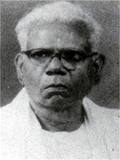A Tribute by A.M.A. Azeez reproduced from a Valedictory Tribute presented by the Kokuvil Hindu College O.B.A. (

Kokuvil Hindu is parting with a Principal who has dedicated his life to the service of the youth of
The Peace of 1918 and the years that followed brought war in our young minds. To us Kemal Pasha and Mahatma Gandhi were gripping personalities more fascinating than legendary heroes of old. Both of them, we dimly recognized, battled against British Imperialism, one with arms and the other with ahimsa. Together they upset the accepted values of our elders who had been securely brought up in the Faith of Stability – that obedience to the Government was obedience to God, a revised version of the Divine Right of the King.
In this atmosphere the names of Sultan and Swaraj became as familiar to us as Kennedy and Nesfield. And our knowledge of the Khalifa and the Indian National Congress were as profound as our understanding of the Latin Language and English Idioms. At this stage came to Jaffna Hindu a group of students from
We therefore avidly availed ourselves of the opportunity to be present as observers at Keerimalai at the Fourth Annual Sessions of the Students’ Congress held in the year 1928. There were many distinguished personages present there. The chief speakers were R. Sri Pathmanathan and Satyamurthi. Both vehemently condemned the British rule in eloquent English, but their approaches were as different as their accents. Another speaker dealt with the evils of the caste system and the subtleties of varnashrama dharma. He explained to the audience in the manner of metaphysics the difference between inter-seating and equal seating in schools. Some expounded the creed of the Congress and some elucidated its goals. But the dominating personality of the Sessions was Handy Master. It was clear to us that he was indeed the guide, philosopher and friend of the Movement. Handy Master was the drafter of its resolutions and the pundit of its procedure. He was the planner of its campaigns and the master of its strategy. In him we found an example of democratic leadership, by merit attained, through affection maintained. We were his silent admirers anxious to learn more from him but unable to proceed unaided. We returned deeply influenced by him with impressions left on our minds which have remained indelible throughout the many years since elapsed.
The purpose of the Students’ Congress was then defined thus: “If you ask me what the goal is towards which we would fain direct our energies, my answer is Swaraj. The ominous word requires some explanation. By Swaraj we mean nothing more and nothing less than the Political, Social and Economic conditions wherein we may give fullest expression to our Swadharma. Swaraj is the state of society where a nation’s self may find complete fulfilment”.
This was the goal aimed at during the twenties. Three decades have passed. The alien ruler has already departed but “Swaraj” has not been attained. All the conditions necessary for the complete fulfilment of the Nation’s self have not been created, either politically, socially or economically. The twelve years that have followed the attainment of Dominion Status have not been quite fruitful of results. In these sorrowful circumstances it is heartening to find that one of the pioneers in the Nationalist Movement of Ceylon is yet with us and is now in a position to devote his entire energy during the remaining years of his life, which we pray shall be long, to the cause of Swaraj for
